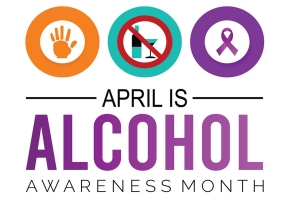
April is Alcohol Awareness Month, a time to raise awareness and understanding of alcohol abuse. Over time, excessive alcohol consumption can lead to the development of chronic diseases and other serious issues that affect your quality of life, physical and mental health. Did you know more than 140,000 deaths occur every year in the United States due to excessive alcohol use? If you or someone you know is struggling with alcohol misuse or abuse, there are ways to help. Here are some steps you can take to ensure that alcohol doesn’t become a problem for you or your loved ones:
• Show compassion. Share your concerns and support with loved ones. Have an honest, clear, and direct conversation about their habits and drinking patterns.
• Understand alcoholism. Educate yourself about the impact of alcohol consumption and discuss with friends and family. Parents, talk to your children about the dangers of alcohol and drug use.
• Limit alcohol consumption or try sobriety all together. If you’re considering changing your drinking habits, you’ll need to decide whether to cut down or quit. It’s a good idea to discuss different options with a healthcare professional, a friend, or someone else you trust. Stick to the recommended guidelines for alcohol.
• Stay occupied in a productive way. Get active by exercising or find enjoyment by learning a new skill or hobby that doesn’t involve alcohol.
• Minimize temptation. Limit the amount of time spent at a bar or other venues that serve alcohol. Engage in social outings and events that do not encourage or center around alcohol.
• Seek additional support. Connect with trained medical professionals for additional help, resources, formalized treatment options, and counseling.
The National Institute on Alcohol Abuse and Alcoholism’s Rethinking Drinking page has interactive resources to help you examine your drinking patterns. For additional resources and information about alcohol use and your health, visit the Centers for Disease Control and Prevention.











